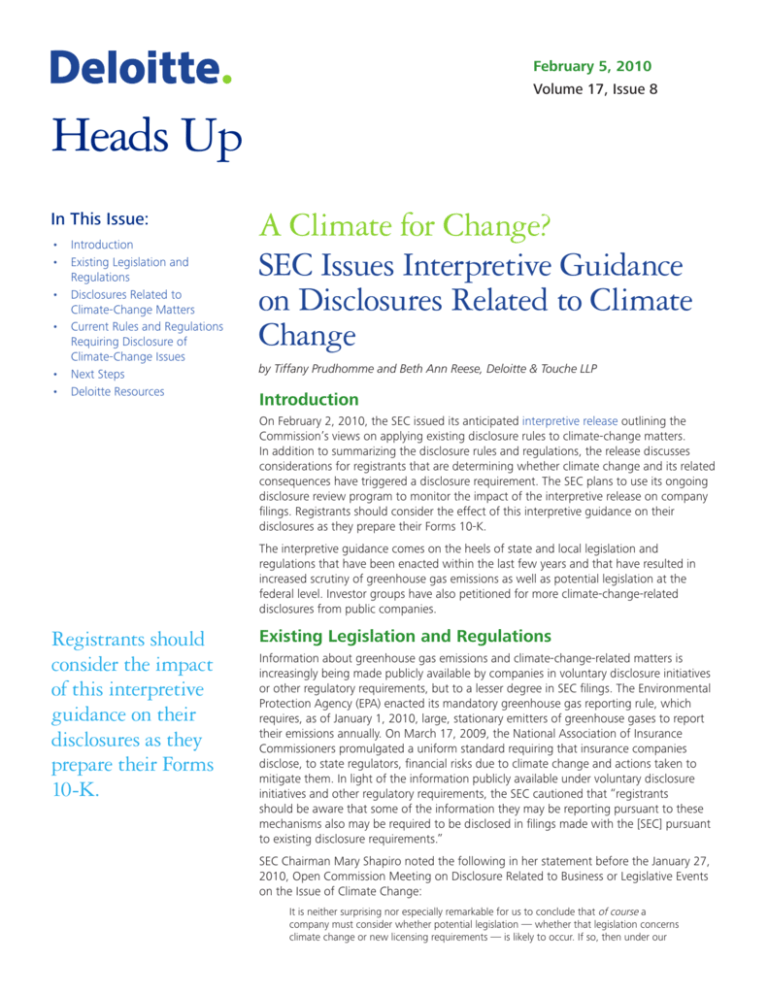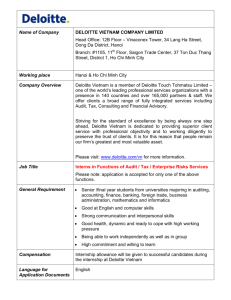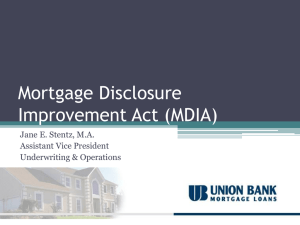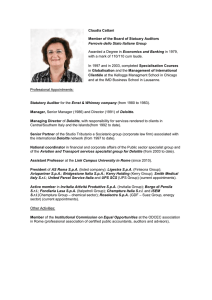
February 5, 2010
Volume 17, Issue 8
Heads Up
In This Issue:
• Introduction
• Existing Legislation and
Regulations
• Disclosures Related to
Climate-Change Matters
• Current Rules and Regulations
Requiring Disclosure of
Climate-Change Issues
• Next Steps
• Deloitte Resources
A Climate for Change?
SEC Issues Interpretive Guidance
on Disclosures Related to Climate
Change
by Tiffany Prudhomme and Beth Ann Reese, Deloitte & Touche LLP
Introduction
On February 2, 2010, the SEC issued its anticipated interpretive release outlining the
Commission’s views on applying existing disclosure rules to climate-change matters.
In addition to summarizing the disclosure rules and regulations, the release discusses
considerations for registrants that are determining whether climate change and its related
consequences have triggered a disclosure requirement. The SEC plans to use its ongoing
disclosure review program to monitor the impact of the interpretive release on company
filings. Registrants should consider the effect of this interpretive guidance on their
disclosures as they prepare their Forms 10-K.
The interpretive guidance comes on the heels of state and local legislation and
regulations that have been enacted within the last few years and that have resulted in
increased scrutiny of greenhouse gas emissions as well as potential legislation at the
federal level. Investor groups have also petitioned for more climate-change-related
disclosures from public companies.
Registrants should
consider the impact
of this interpretive
guidance on their
disclosures as they
prepare their Forms
10-K.
Existing Legislation and Regulations
Information about greenhouse gas emissions and climate-change-related matters is
increasingly being made publicly available by companies in voluntary disclosure initiatives
or other regulatory requirements, but to a lesser degree in SEC filings. The Environmental
Protection Agency (EPA) enacted its mandatory greenhouse gas reporting rule, which
requires, as of January 1, 2010, large, stationary emitters of greenhouse gases to report
their emissions annually. On March 17, 2009, the National Association of Insurance
Commissioners promulgated a uniform standard requiring that insurance companies
disclose, to state regulators, financial risks due to climate change and actions taken to
mitigate them. In light of the information publicly available under voluntary disclosure
initiatives and other regulatory requirements, the SEC cautioned that “registrants
should be aware that some of the information they may be reporting pursuant to these
mechanisms also may be required to be disclosed in filings made with the [SEC] pursuant
to existing disclosure requirements.”
SEC Chairman Mary Shapiro noted the following in her statement before the January 27,
2010, Open Commission Meeting on Disclosure Related to Business or Legislative Events
on the Issue of Climate Change:
It is neither surprising nor especially remarkable for us to conclude that of course a
company must consider whether potential legislation — whether that legislation concerns
climate change or new licensing requirements — is likely to occur. If so, then under our
traditional framework the company must then evaluate the impact it would have on the
company’s liquidity, capital resources, or results of operations, and disclose to shareholders
when that potential impact will be material. Similarly, a company must disclose the
significant risks that it faces, whether those risks are due to increased competition or severe
weather. These principles of materiality form the bedrock of our disclosure framework.
Disclosures Related to Climate-Change Matters
The interpretive release addresses four topics related to climate-change matters that
registrants should consider when assessing what information to provide in their filings
under existing SEC disclosure requirements.
Impact of Legislation and Regulation
Developments in federal and state legislation and regulation on climate change may
trigger disclosure obligations. Registrants should determine what specific risks they
face as a result of climate-change legislation or regulation. A registrant’s sensitivity to
certain legislation or regulations may vary according to the nature of its business and
industry. The interpretive release notes that a registrant should “avoid generic risk factor
disclosure” that could apply to any registrant.
Developments in
federal and state
legislation and
regulation on
climate change may
trigger disclosure
obligations.
Management’s Discussion and Analysis of Financial Condition and Results of Operations
(MD&A) disclosures are required for any known uncertainty, such as pending legislation
or regulation that a registrant determines is reasonably likely1 to be enacted and is
reasonably likely to have a material effect on the registrant and its financial condition or
results of operations. The registrant should also consider disclosure of the “difficulties
involved in assessing the timing and effect of the pending legislation or regulation,” if
material.
The interpretive release also indicates that a “registrant should not limit its evaluation of
disclosure of a proposed law only to negative consequences.” Changes to a registrant’s
business practices as a result of changes in the law may present new opportunities for
certain registrants (e.g., “if a ‘cap and trade’ type system is put in place, registrants may
be able to profit from the sale of allowances if their emissions levels end up being below
their emissions allotment”).
Other examples of possible consequences of pending legislation and regulation related to
climate change cited in the interpretive release include:
• Costs to purchase, or profits from sales of, allowances or credits under a “cap and
trade” system;
• Costs required to improve facilities and equipment to reduce emissions in order to
comply with regulatory limits or to mitigate the financial consequences of a “cap and
trade” regime; and
• Changes to profit or loss arising from increased or decreased demand for goods and
services produced by the registrant arising directly from legislation or regulation, and
indirectly from changes in costs of goods sold.
International Accords
Registrants should consider and disclose, when material, the business effect of
international accords and treaties related to climate change, specifically those associated
with governance of greenhouse gas emissions. The disclosure obligations related to U.S.
climate-change regulations also apply to international accords.
Indirect Consequences of Regulation or Business Trends
Registrants should consider the need to disclose, as risk factors or in MD&A, the actual
and potential indirect consequences of regulations or business trends related to climate
change (e.g., reduced demand for greenhouse-gas-producing products, increased
demand for energy from alternative sources). If the potential impacts are significant
enough, disclosure may also be required in the registrant’s business description. In
“Reasonably likely” is a lower disclosure standard than “more likely than not.” See SEC Release No. 33-8056.
1
2
addition, registrants need to determine whether the potential for reputational damage
due to public perception of the potential adverse consequences to the entity’s business
would warrant the inclusion of a risk factor related to reputation.
Physical Impacts of Climate Change
Registrants should consider the actual and potential impacts of the physical effects
of climate change on the business. When an entity is particularly vulnerable to severe
weather or climate-related events, the registrant should disclose the material risks and
related consequences of such weather or events. The interpretive release indicates the
following possible consequences of severe weather:
• For registrants with operations concentrated on coastlines, property damage and disruptions to operations, including manufacturing operations or the transport of
manufactured products;
• Indirect financial and operational impacts from disruptions to the operations of major
customers or suppliers from severe weather, such as hurricanes or floods;
• Increased insurance claims and liabilities for insurance and reinsurance companies;
[footnote omitted]
• Decreased agricultural production capacity in areas affected by drought or other
weather-related changes; and
• Increased insurance premiums and deductibles, or a decrease in the availability of
coverage, for registrants with plants or operations in areas subject to severe weather.
The interpretive
release also
highlights the SEC’s
existing rules that
may require
disclosure of
material climatechange matters.
Current Rules and Regulations Requiring Disclosure of
Climate-Change Issues
The interpretive release also highlights the SEC’s existing rules that may require disclosure
of material climate-change matters, such as the following Items of Regulation S-K:
• Item 101, “Description of Business” — Item 101 requires a registrant to describe
its business and that of its subsidiaries. In addition, Item 101 expressly requires
disclosures about certain costs of complying with environmental laws.
• Item 103, “Legal Proceedings” — Item 103 requires a registrant to briefly
describe any material pending legal proceeding to which it or any of its subsidiaries
is a party and to which its property is the subject of litigation. Instruction 5 in Item
103 includes some requirements that apply to disclosure of certain environmental
litigation.
• Item 303, “Management's Discussion and Analysis of Financial Condition
and Results of Operations” — Item 303 includes a broad range of disclosure
items that address the registrant's liquidity, capital resources, and results of
operations. Certain provisions of Item 303 specify the disclosures required for
compliance, but in other instances the guidance includes principles that require
management’s judgment. For example, “registrants must identify and disclose known
trends, events, demands, commitments and uncertainties that are reasonably likely
to have a material effect on financial condition or operating performance” (footnote
omitted). Item 303 does not specify what period a registrant must consider in
assessing the impact of a known trend, event, or uncertainty that is reasonably likely
to occur.
The interpretive release reiterates that the drafting of MD&A disclosures “should
focus on material information,” and while materiality may limit what a registrant
discloses, it “should not limit the information that management considers in making
its determinations.” Instead, management should consider “all relevant information
even if that information is not required to be disclosed.” To capture all relevant
sources of information, management should consider whether it has sufficient
disclosure controls and procedures in place.
3
• Item 503, “Prospectus Summary, Risk Factors, and Ratio of Earnings to
Fixed Charges” — Item 503(c) requires a registrant to provide, when appropriate,
under the heading “Risk Factors,” a "discussion of the most significant factors that
make [an investment in the registrant] speculative or risky."
In addition to the disclosure requirements of Regulation S-K and Regulation S-X,
Securities Act Rule 408 and Exchange Act Rule 12b-20 require a registrant to disclose
“such further material information, if any, as may be necessary to make the required
statements, in light of the circumstances under which they are made, not misleading.”
Next Steps
The SEC’s Investor Advisory Committee will consider climate-change disclosures in its role
as an advisor to the SEC. Disclosures on climate change matters are also expected to be
the subject of a public roundtable planned by the Commission for the spring of 2010. On
the basis of insights gained from the Investor Advisory Committee and the roundtable,
the SEC plans to determine whether additional guidance or rulemaking on climatechange disclosures is necessary.
Deloitte Resources
For Deloitte’s perspective on a range of climate-change and sustainability-related topics,
please see the following whitepapers:
• Carbon Accounting Challenges: Are You Ready?
• A Climate for Change? Understanding the Tax Implications of U.S. Greenhouse Gas
Regulation.
The SEC’s Investor
Advisory
Committee will
consider climatechange disclosures
in its role as an
advisor to the SEC.
• Confronting the Carbon Challenge: Business Implications of the Developing North
American Carbon Markets.
• CFO Insights: Are Your Green Initiatives Tax Efficient?
• CFO Insights: Sustainability: Developing Key Performance Indicators: Measuring
Sustainability Is the Bottom Line.
• Lifecycle Assessment: Where Is It on Your Sustainability Agenda?
• The Risk Intelligent Approach to Corporate Responsibility and Sustainability.
Please contact Eric Hespenheide or Kathryn Pavlovsky in Deloitte’s Enterprise Sustainability
group, or Stephen Engler or Pat Concessi in Deloitte’s Carbon Management Services
practice, if you have questions about the information in this Heads Up.
4
Subscriptions
If you wish to receive Heads Up and other accounting publications issued by Deloitte’s Accounting Standards and
Communications Group, please register at www.deloitte.com/us/subscriptions.
Dbriefs for Financial Executives
We invite you to participate in Dbriefs, Deloitte’s webcast series that delivers practical strategies you need to stay on top of
important issues. Gain access to valuable ideas and critical information from webcasts in the "Financial Executives" series on
the following topics:
• Corporate governance.
• FAS 109. • Private companies.
• Driving enterprise value.
• Financial reporting.
• Risk intelligence.
• Transactions and business events.
Dbriefs also provides a convenient and flexible way to earn CPE credit — right at your desk. Join Dbriefs to receive
notifications about future webcasts at www.deloitte.com/us/dbriefs.
Registration is available for this upcoming 60-minute Dbriefs webcast:
• Offense, Defense, Common Sense: Preparing for a New Age of White Collar Investigations and Litigation (February 8).
Use the link above to register. The webcast begins at 2 p.m. (EST).
Technical Library: The Deloitte Accounting Research Tool
Deloitte makes available, on a subscription basis, access to its online library of accounting and financial disclosure literature.
Called Technical Library: The Deloitte Accounting Research Tool, the library includes material from the FASB, the EITF, the
AICPA, the PCAOB, the IASB, and the SEC, in addition to Deloitte’s own accounting and SEC manuals and other interpretive
accounting and SEC guidance.
Updated every business day, Technical Library has an intuitive design and navigation system that, together with its powerful
search features, enable users to quickly locate information anytime, from any computer. In addition, Technical Library
subscribers receive Technically Speaking, the weekly publication that highlights recent additions to the library.
For more information, including subscription details and an online demonstration, visit www.deloitte.com/us/techlibrary.
Heads Up is prepared by the National Office Accounting Standards and Communications Group of Deloitte
as developments warrant. This publication contains general information only and Deloitte is not, by means of
this publication, rendering accounting, business, financial, investment, legal, tax, or other professional advice
or services. This publication is not a substitute for such professional advice or services, nor should it be used
as a basis for any decision or action that may affect your business. Before making any decision or taking any
action that may affect your business, you should consult a qualified professional advisor.
Deloitte shall not be responsible for any loss sustained by any person who relies on this publication.
As used in this document, “Deloitte” means Deloitte LLP and its subsidiaries. Please see
www.deloitte.com/us/about for a detailed description of the legal structure of Deloitte LLP and its subsidiaries.
Copyright © 2010 Deloitte Development LLC. All rights reserved.





